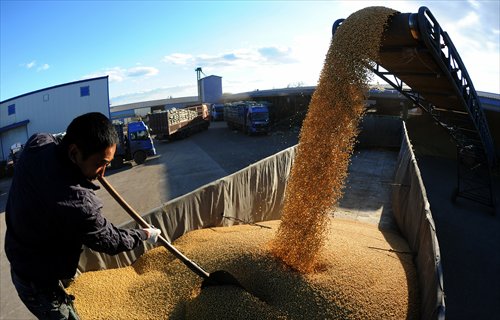Many farmers in Northeast China grow GM soybeans despite official ban

A worker helps load soybeans onto a truck on October 16, 2014 in Nenjiang, Heilongjiang Province. Farmers in the county harvested around 267,000 hectares of non-GM soybeans that year. Photo: CFP
Farmers in Heilongjiang Province have been found illegally growing genetically modified (GM) soybeans, media reports revealed Saturday.
While the northeastern province is a key soybean-producing area, the use of GM crops is strictly regulated in China, with no GM foodstuffs having yet been approved for domestic production.
Despite the ban, an official from the Heilongjiang provincial agricultural department said that around 10 percent of the region's soybean farmers are growing GM crops.
The local authorities said they are investigating the case, and if any farmers are found to be guilty of growing illegal crops they could face a fine of up to 200,000 yuan ($31,480).
Illegal planting
Middlemen who buy soybeans from farmers and sell them on to companies which process them into cooking oil, tofu and soy milk have discovered farmers in the region selling GM crops.
"We previously saw some GM soybeans mixed with other beans [when they would buy beans from groups of farmers]. But when we saw the warehouses [of individual farmers], they were totally filled with GM soybeans," a soybean dealer told the China Business Journal.
The dealer said farmers know that they are planting GM crops, and that they do it to pursue greater yields and higher profits. But he said many farmers didn't realize that this is illegal.
A local farmer surnamed Wen, who has grown soybeans for a long time, said that farmers are eagerly awaiting permission to grow GM soybeans.
Despite being illegal to both grow and sell, farmers can purchase GM soybean seeds at agricultural exhibitions and online. Some farmers reached by the Global Times said that they have bought illegal GM seeds on Internet stores such as Taobao.com.
The world's biggest multinational agrochemical and agricultural biotechnology corporation, Monsanto, said previously they do not sell GM soybean seeds to Chinese farmers.
According to an informed source who requested anonymity, most soybean dealers do not test whether the soybeans they buy are GM or not.
Controversial impact
GM products are controversial around the world. Some see them as a useful technological advancement, while others consider them to be "unnatural" and potentially harmful.
Luo Yunbo, a GM food expert with the China Agricultural University, told the Global Times that GM technology could lead to high-quality, low-cost soybeans which could be more competitive in the market, compared with non-GM soybeans.
But a soybean expert, Xu Jianfei, said Chinese soybeans will "have no place" in the international market if they are "polluted" by GM. However, only a small proportion of China's soybeans are exported.
The population of Heilongjiang is about 38 million, and its residents consume 760,000 tons of cooking oil made from soybeans annually. Local companies can only produce 300,000 tons of cooking oil, while the other 460,000 tons, which are processed in other provinces, are almost all made using imported GM soybeans, according to statistics the Heilongjiang Soybean Association provided to the Global Times.
Some Heilongjiang-based companies, which produce cooking oil from only non-GM soybeans, said their business has been hurt by the large-scale importation of cheap GM soybeans, which caused their production to decline dramatically from 120,000 tons in 2009 to 50,00o tons in 2014.
Lu Baorong, a professor of life sciences at Shanghai-based Fudan University, told the Global Times Saturday that GM soybeans should be promoted cautiously. "Protecting local genetic diversity is a priority for Heilongjiang, even if GM soybeans are proved to be safe," Lu said.
"Modified genes could be transferred through pollen, which would have a negative influence on soybean diversity," Lu said.
This year's No.1 Central Document, a central government edict on agricultural matters, specifies that GM technologies should be "scientifically expanded."
But it doesn't stipulate which GM crops should be planted. Only seven GM agricultural products have gotten safety certificates so far.
"GM soybean production on large farms is feasible in the future," Lu said.
China Business Journal contributed to the story
Newspaper headline: Bean bandits